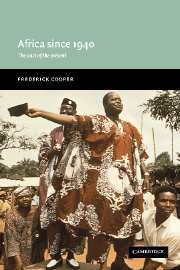Book contents
- Frontmatter
- Contents
- List of plates
- List of figures
- List of maps
- List of tables
- Preface
- Map 1 Africa: countries and cities, c. 2000
- 1 Introduction: from colonies to Third World
- 2 Workers, peasants, and the crisis of colonialism
- 3 Citizenship, self-government, and development: the possibilities of the post-war moment
- 4 Ending empire and imagining the future
- Interlude: rhythms of change in the post-war world
- 5 Development and disappointment: social and economic change in an unequal world, 1945–2000
- 6 The late decolonizations: southern Africa 1975, 1979, 1994
- 7 The recurrent crises of the gatekeeper state
- 8 Africa at the century's turn: South Africa, Rwanda, and beyond
- Index
8 - Africa at the century's turn: South Africa, Rwanda, and beyond
- Frontmatter
- Contents
- List of plates
- List of figures
- List of maps
- List of tables
- Preface
- Map 1 Africa: countries and cities, c. 2000
- 1 Introduction: from colonies to Third World
- 2 Workers, peasants, and the crisis of colonialism
- 3 Citizenship, self-government, and development: the possibilities of the post-war moment
- 4 Ending empire and imagining the future
- Interlude: rhythms of change in the post-war world
- 5 Development and disappointment: social and economic change in an unequal world, 1945–2000
- 6 The late decolonizations: southern Africa 1975, 1979, 1994
- 7 The recurrent crises of the gatekeeper state
- 8 Africa at the century's turn: South Africa, Rwanda, and beyond
- Index
Summary
April 1994. In that month, the planned extermination of Rwanda's Tutsi population began, and South Africans of all colors and origins voted for the first time to select their government. This book began with these two events, which seemed to reveal Africa's two futures: one of electoral democracy, the other of ethnic violence. Viewed statically, those labels convey hopes and fears in many parts of the continent. Viewed historically, they are inadequate, and this book has explored the past that has shaped this present.
Rwanda turns out to be one of the least culturally divided former colonies of Africa. Difference will not explain the genocide, nor will “ancient hatreds.” A particular historical trajectory was described in chapter 1: a history of inequality of power and wealth in the pre-colonial kingdom, of the ethnicization of difference under colonial rule, of growing tension as the possibility of African autonomy became clear, of Belgian indifference to anti-Tutsi violence as a Hutu-led government came to power. It is a history of that government's inability to manage the politics of a gatekeeper state in the face of diminishing resources, of conflict with refugee Tutsi whose only recourse was to try to get access to the state on the battlefield, and of government officials and clients building a propaganda machine and militia organization to stir up hatred and prepare for the slaughter of Tutsi.
- Type
- Chapter
- Information
- Africa since 1940The Past of the Present, pp. 191 - 204Publisher: Cambridge University PressPrint publication year: 2002



